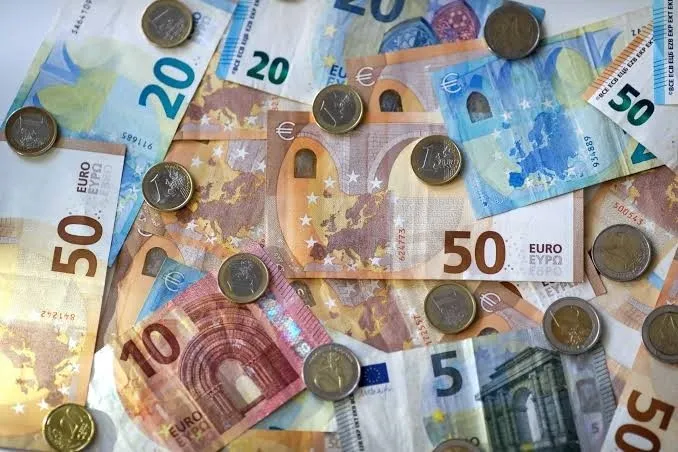简体中文
繁體中文
English
Pусский
日本語
ภาษาไทย
Tiếng Việt
Bahasa Indonesia
Español
हिन्दी
Filippiiniläinen
Français
Deutsch
Português
Türkçe
한국어
العربية
European Interest Rate Expectations are High, Euro Returns to Strengthen
Abstract:The European Central Bank (ECB) has announced a new jumbo hike of interest rates in a bid to bring down record inflation in the eurozone. Before that, The euro continued to perform well in the market. It was buoyed by expectations of a rate hike for the next policy meeting of the European Central Bank (ECB).

The European Central Bank (ECB) has announced a new jumbo hike of interest rates in a bid to bring down record inflation in the eurozone. Before that, The euro continued to perform well in the market. It was buoyed by expectations of a rate hike for the next policy meeting of the European Central Bank (ECB).
When this news was written in the middle of Thursday's European session EUR/USD again rose by a nine-month high. Meanwhile, the EUR/GBP also rebounded from a one-month low position.
President Christine Lagarde last December had revealed a plan to raise interest rates by 50 basis points. That may be done in the next few ECB meetings.
This intention provoked controversy within people. That is why; some market participants doubted its realization. Bloomberg also reported rumours that the ECB might only raise interest rates by 25 basis points in March.
Investors Underestimated the Projected Rate Hike
The central bank's interest rates have a cascading effect across the eurozone and directly influence the rates that commercial banks offer to households and businesses. The decision above was maybe taken by ECB after raising 50 basis points in February. Rumours from the unnamed source hit the euro rate earlier in the week.
However, ECB officials immediately voiced a rebuttal to the rumors and revived the euro rate. Klaas Knot, head of the Dutch central bank and member of the ECB's Board of Governors, said investors underestimated the ECB's projected rate hike.
He even asserted that this institution may need to raise their rates by 50 basis points a few more times in order to lower the rate of inflation. It is not going to stop after one 50 basis point increase.
Knot said that and he was pretty sure about it. A lot of things need to address, and the experts are going to address that at a constant rate of 50 basis point increases.
The bank's three key interest rates were each bumped by three-quarters of a percentage point, the same as they did in September.
50 BP Increase is Expected
Rate increases aim to slow inflation, but they also boost the cost of borrowing. In the last year, interest rates have jumped by about 3% for credit cards, and have nearly doubled for auto financing and adjustable-rate loans and mortgages. With Tuesdays increase, those costs will rise slightly. Another member of the ECB Board of Governors, Francois Villeroy de Galhau, expressed a similar message on Wednesday, he wants to remind people of the words from President Lagarde.
Those were stated in his last press conference in December: For this case, people should expect to raise interest rates at a rate of 50 basis points over a period of time.
Well, those words are still valid on 21st. The EUR/USD rally was also supported by the depreciation of the US dollar. Markets believe the US Federal Reserve will only raise interest rates by 25 basis points at its next FOMC meeting,
Meanwhile, the Americas economy shows signs of an increasingly visible recession. Elsewhere, The US dollar index (DXY) experienced further weakness in the Asian session on Thursday.
NZD/USD slipped by 5%, however, AUD/USD and NZD/USD instead fell short of previous record highs. AUD/USD has fallen about 0.6 percent to 0.6900s as this news was written.
Meanwhile, the NZD/USD slipped about 0.5 percent to 0.6400s. Several factors weighed on the antipodean currency duo on 21st. First, market sentiment worsened as the release of U.S. retail sales data last night heightened fears of a global recession.
The Australian dollar and New Zealand dollar are among the currencies that are very sensitive to such changes in sentiment, so they also weakened in the second half of the New York session.
Market sentiment further deteriorated following two further news. Those are the release of Australian labor data and the resignation of the New Zealand PM.
The Layoff Increases
Both are likely to have no impact in the long term, but are of concern to some market participants in the short term. Layoffs Increase Australia's employment data showed a 14.6k drop in the number of people employed in December.
In short, consensus expects an increase of as much as 22.5k. Australia's unemployment rate also stagnated at 3.5%, or worse than the consensus estimate pegged at 3.4%.
Developments in these data are relatively moderate, so they will not necessarily affect the policy making of the Australian central bank (RBA).
The Australian Statistics Agency (ABS) also confirmed that labor market conditions are still tight. It is as immigration flows have boosted the growth of the productive age population beyond pre-pandemic times.

Disclaimer:
The views in this article only represent the author's personal views, and do not constitute investment advice on this platform. This platform does not guarantee the accuracy, completeness and timeliness of the information in the article, and will not be liable for any loss caused by the use of or reliance on the information in the article.
Read more

The Impact of Interest Rate Decisions on the Forex Market
Interest rate changes determine currency attractiveness, influencing capital flows and exchange rate trends. Understanding this mechanism helps investors navigate the forex market effectively.

How a Housewife Lost RM288,235 in a Facebook Investment Scam
A 47-year-old housewife in Malaysia recently fell victim to an online investment scam, losing a substantial sum of RM288,235 after engaging with a fraudulent scheme advertised on Facebook.

Interactive Brokers Launches Forecast Contracts in Canada for Market Predictions
Interactive Brokers introduces Forecast Contracts in Canada, enabling investors to trade on economic, political, and climate outcomes. Manage risk with ease.

Bank Negara Malaysia Flags 12 New Companies for Unauthorised Activity
Bank Negara Malaysia (BNM) has updated its Financial Consumer Alert List (FCA List) by adding 12 more entities, reinforcing its efforts to warn the public against unregulated financial schemes. Check if your broker made the list!
WikiFX Broker
Latest News
INFINOX Partners with Acelerador Racing for Porsche Cup Brazil 2025
The Dark Side of Trading Gurus: Are You Following a Fraud?
Currency Calculator







